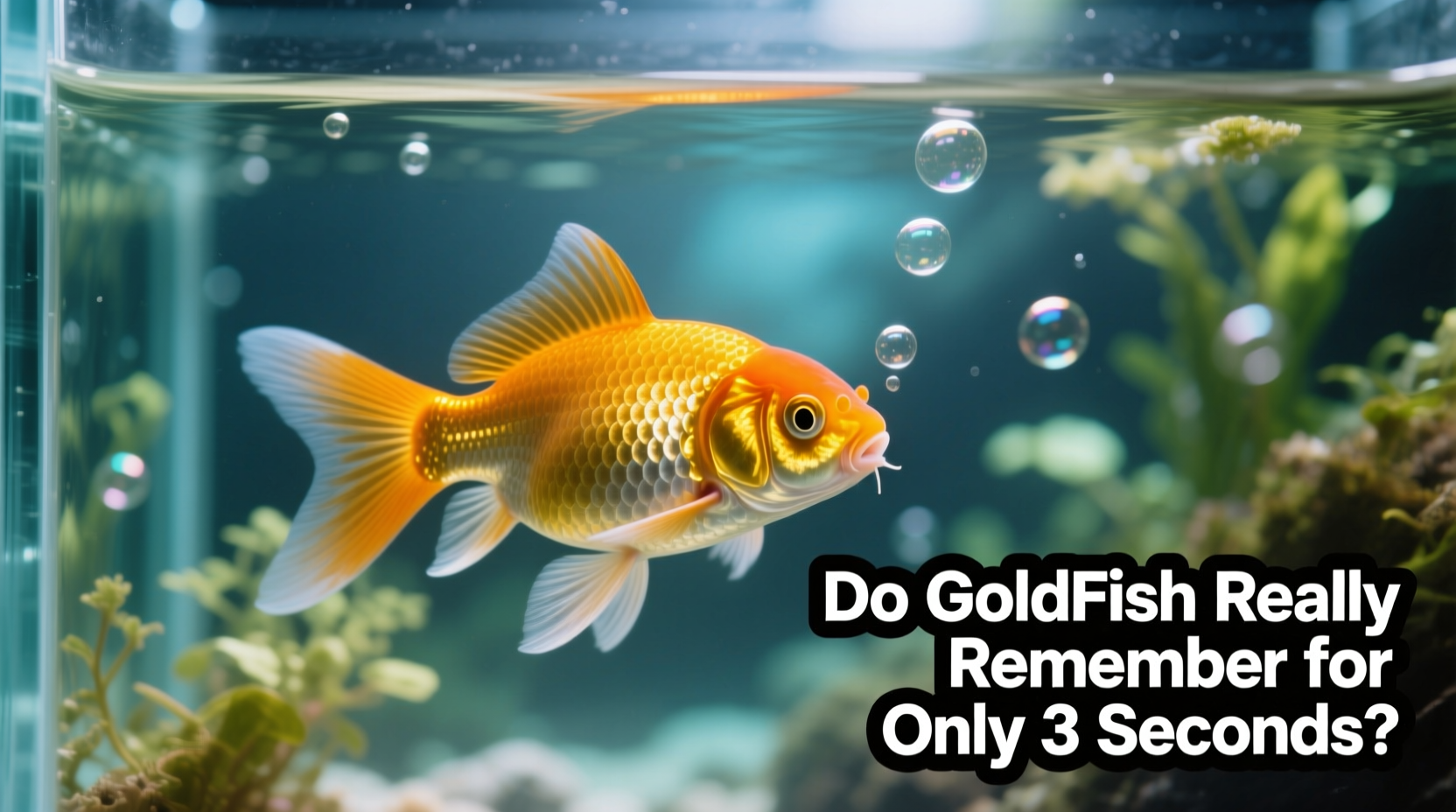The idea that goldfish have a three-second memory is one of the most persistent myths in popular animal lore. It's commonly cited as a reason why these fish thrive in small bowls—after all, if they can't remember anything beyond a few seconds, how could their environment matter? But this belief, while widespread, is fundamentally false. In reality, goldfish possess far more sophisticated cognitive abilities than most people assume. Scientific studies over the past several decades have consistently demonstrated that goldfish can learn, retain information for months, and even recognize patterns and individuals. This article explores the origins of the myth, examines the scientific evidence debunking it, and reveals what we now know about goldfish intelligence.
The Origins of the Three-Second Memory Myth

The notion that goldfish have an extremely short memory likely emerged from casual observation. Watching a goldfish swim in circles or repeatedly approach the same spot in a tank might give the impression that it lacks awareness of its surroundings. Without understanding fish behavior, it’s easy to misinterpret repetition as forgetfulness rather than instinct or learned habit.
This myth gained traction through cultural repetition—repeated in children’s cartoons, jokes, and even educational materials. Over time, it became accepted as common knowledge, despite lacking scientific backing. The simplicity of the claim made it memorable: “goldfish only remember things for three seconds.” However, like many animal myths—from bats being blind to ostriches burying their heads—it persists not because it’s true, but because it’s catchy.
What’s often overlooked is that fish, including goldfish, are vertebrates with brains capable of complex processing. They belong to the class Actinopterygii and have evolved over millions of years to survive in dynamic aquatic environments. For such survival, basic learning and memory are essential—not just reflexive responses, but adaptive behaviors based on experience.
Scientific Evidence Against the Myth
Decades of controlled experiments have disproven the three-second memory claim. One of the most compelling studies was conducted by researchers at Plymouth University in the UK. In a series of behavioral tests, goldfish were trained to associate a specific sound with feeding time. After conditioning, the fish responded to the sound alone—even when food wasn’t immediately present. More impressively, they retained this learned association for up to **five months**.
In another experiment, goldfish were taught to navigate mazes to reach a food reward. Over repeated trials, they improved their performance significantly, demonstrating both spatial learning and memory retention. Some fish completed the maze faster each time, indicating they remembered previous routes and avoided dead ends.
Researchers have also shown that goldfish can distinguish between different shapes, colors, and even musical tones. In one case, a goldfish was trained to push a lever at certain times of day to receive food—proving they can learn time-based tasks, a skill requiring long-term memory and internal biological clocks.
“Fish are more intelligent than we give them credit for. Goldfish, in particular, show robust learning capabilities and long-term memory formation.” — Dr. Culum Brown, Behavioral Ecologist and Fish Cognition Expert
How Long Do Goldfish Actually Remember?
Rather than three seconds, goldfish can remember information for **months**, and possibly longer under optimal conditions. Their memory capacity depends on several factors, including age, environment, diet, and mental stimulation.
Studies suggest that goldfish can:
- Remember feeding locations for weeks
- Recognize their human caregivers after days or weeks of absence
- Learn to respond to visual cues (e.g., a red ball) associated with rewards
- Retain escape routes from predators or stressful situations
- Differentiate between humans who feed them and those who don’t
Memory in goldfish isn’t just limited to food-related training. Experiments have shown they can be conditioned to avoid certain areas of a tank where they previously experienced discomfort, such as mild electric shocks or sudden water changes. This avoidance behavior persists for weeks, further confirming long-term associative memory.
Real-World Example: The Trained Goldfish That Drove a Tiny Car
In a groundbreaking 2022 experiment at Ben-Gurion University in Israel, researchers tested the spatial cognition of goldfish using a novel setup: a robotic fish tank mounted on wheels, known as the \"Fish Operated Vehicle\" (FOV). The goal? To see if a goldfish could navigate a land-based vehicle toward a target.
The fish was placed in a transparent tank on a mobile platform equipped with sensors. When the fish swam toward one side of the tank, the vehicle moved in that direction. A laser pointer served as a target on the wall across the room. Within days, the goldfish learned to drive the vehicle toward the target, avoiding obstacles and correcting course when off track.
Not only did the fish succeed in reaching the target from different starting points, but they also retained the skill after breaks of several days. This experiment proved that goldfish can understand spatial relationships beyond their aquatic environment—a level of cognitive flexibility previously underestimated.
This case study challenges assumptions not just about goldfish, but about fish intelligence broadly. It suggests that environmental limitations (like living in water) don’t equate to mental limitations.
Factors That Influence Goldfish Memory and Intelligence
Like all animals, goldfish perform better cognitively when their physical and psychological needs are met. A well-cared-for goldfish in a stimulating environment will exhibit stronger learning and memory than one kept in poor conditions.
Key factors include:
| Factor | Positive Impact | Negative Impact |
|---|---|---|
| Tank Size | Larger tanks allow exploration and spatial learning | Small bowls restrict movement and mental stimulation |
| Water Quality | Clean water supports brain health and activity | Toxins like ammonia impair neurological function |
| Diet | Balanced nutrition enhances cognitive performance | Poor diet leads to lethargy and reduced learning |
| Mental Stimulation | Toys, varied layouts, and training boost memory | Monotonous environments lead to boredom and stagnation |
| Social Interaction | Interaction with other fish or humans improves alertness | Isolation may reduce engagement and responsiveness |
Practical Tips to Enhance Your Goldfish’s Cognitive Health
You don’t need a lab to engage your goldfish’s mind. Simple daily practices can make a big difference in their well-being and mental sharpness. Here’s a checklist you can follow:
📋 Goldfish Brain-Boosting Checklist- Provide a tank of at least 20 gallons for a single goldfish
- Add safe decorations like plants, tunnels, and rocks to encourage exploration
- Vary feeding times and locations to promote problem-solving
- Use a feeding ring or target stick to train your fish to follow cues
- Introduce new objects gradually to stimulate curiosity
- Perform regular water changes (25% weekly) to maintain clarity and health
- Spend time near the tank daily so your fish learns to recognize you
- Avoid loud noises or sudden movements that cause stress
Common Misconceptions About Goldfish Care
The memory myth has had real consequences for how goldfish are treated. Because people believe they don’t notice their surroundings, many are kept in bowls, which are inadequate for their size, oxygen needs, and waste management. This misconception leads to shortened lifespans and poor quality of life.
In reality, goldfish can live 10–15 years or more with proper care—and some have lived over 20 years. Their growth, immune function, and cognitive abilities all depend on a healthy, enriched environment.
Here’s a quick comparison of common beliefs versus the facts:
| Myth | Reality |
|---|---|
| Goldfish belong in bowls | Bowls lack filtration, space, and oxygen; tanks are required |
| They grow to the size of their tank | They become stunted and unhealthy if space is limited |
| They don’t recognize people | Many learn to identify their owners and respond to them |
| They don’t need companions | They are social and often thrive with compatible tank mates |
| They only live a few months | Lifespan exceeds a decade with proper care |
Frequently Asked Questions
Can goldfish really learn tricks?
Yes, goldfish can be trained to perform simple behaviors like swimming through hoops, following a finger, or pushing a ball into a goal. Clicker training, similar to methods used with dogs, has been successfully applied to goldfish using sound cues paired with food rewards.
Do goldfish get bored?
While we can’t know exactly what fish feel, behavioral signs suggest that goldfish in unchanging environments become less active and less responsive. Introducing novelty—such as rearranging decorations or adding floating toys—can re-engage them, indicating that mental stimulation matters.
If goldfish have good memories, why do they swim in circles?
Circling behavior is often misinterpreted. It can be a sign of curiosity, anticipation (especially near feeding time), or even poor water conditions. In enriched environments, goldfish display a wide range of exploratory behaviors, not just repetitive motion.
Conclusion: Rethinking What We Know About Goldfish
The myth of the three-second memory has done a disservice to one of the most resilient and intelligent pet fish species. Far from being forgetful creatures, goldfish demonstrate impressive learning, memory, and adaptability. They form associations, recall events over months, and respond meaningfully to their environments and caretakers.
Understanding their true cognitive abilities should change how we care for them. Instead of relegating them to tiny bowls based on outdated assumptions, we should provide spacious, clean, and stimulating habitats that support their natural behaviors and mental health.
By challenging long-held myths with science, we not only improve animal welfare but also deepen our appreciation for the complexity of life—even in a small fish with shimmering scales.









 浙公网安备
33010002000092号
浙公网安备
33010002000092号 浙B2-20120091-4
浙B2-20120091-4
Comments
No comments yet. Why don't you start the discussion?